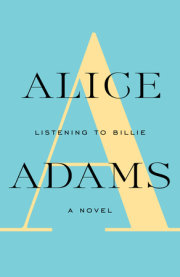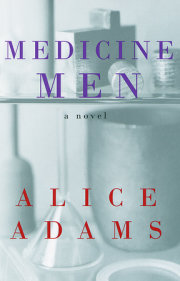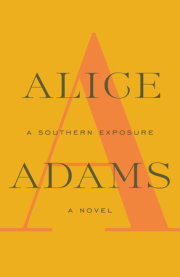Every evening, despairingly, Mary Alexander, a former actress, puts out tin bowls of food for Linda, her cat, who is lost: stolen, starving somewhere, locked in a strange garage--maybe dead. In any case, gone. And every morning, on the deck of her small house in Larkspur, California, Mary examines the bowls and sees that nothing is gone, and her heart seems to shrink within her, her blood to chill. Out there among all the pots of luxuriant roses, bright geraniums, and climbing, profusely flowering bougainvillea, Mary looks blindly at all that color, that bloom, and at her pretty house, in the rare fine August sunlight, and she mourns for Linda; she is inhabited, permeated with loss. She takes in the plates and washes them off; she makes and eats her own breakfast, and then goes out for a walk. She spends the day in an effort to pull herself together, as she looks and looks, and calls and calls for Linda. And then at night she puts out the food again, and she waits, and hopes. For lovely Linda, who is as beautiful and as shy as a little fox.
This is very neurotic, Mary lectures herself, rather in the voice of her very helpful former shrink, a gentle, kindly, and most courteous man from Louisiana, who spoke in those attractive accents, and whose sternest chiding was, "That's just plain neurotic." And he would smile, acknowledging that they both already knew she was neurotic; that very likely most people are, including himself.
For comfort, Mary sometimes thinks of a man she considers the least neurotic among her friends: Bill, a biologist. Internationally known, he goes to conferences all over; he does a lot of work in Africa on AIDS. Bill is absolutely devoted to Alison, his wife, herself a distinguished watercolorist. Bill is also intensely attached to Henry, their cat. Once, in fact (this is the memory from which Mary takes comfort), Henry was reported missing by their housesitter; Bill and Alison were on a rare vacation in Paris. Many transatlantic phone calls ensued; Bill was almost on the plane to come back from Paris, to walk every block of their San Francisco neighborhood--when, of course, Henry strolled into their house, insouciant and dirty. But Bill, this internationally famous scientist, had been poised to cut short a trip with his much-loved wife, to come home from Paris to look for Henry, his cat. All of which now makes Mary feel a little less crazy, less "neurotic," but no less sad.
Mary's own life, viewed by any friend or acquaintance, would be judged comparatively rich, and in many ways successful. Early days in New York included occasional Broadway parts, some off-Broadway, and mostly good reviews. Too little money, usually, and too many (but generally good) love affairs. Then the move to San Francisco, the Actors Workshop, and ACT, plus some TV ad work, boring but well paid. More love affairs, some of which became rewarding friendships. Even now, at what she herself considers an advanced age, there is a man with whom she sometimes sleeps (Mary much dislikes the phrase to have sex, but they do), a man of whom she is most extremely fond (which surely beats being in love, has been Mary's conclusion). They would see each other more, except that he has a very mean, vindictive lawyer wife; it is not all perfect, but then, what is? In any case, Mary's life does not fit the stereotype of the lonely old woman whose only companion is her cat.
Mary was never beautiful; as a very young woman she was too thin, almost gaunt, with a long thin nose, a wide and sensual mouth. But she was both intelligent and talented, capable of projecting passion, irony, and humor, qualities that she could be said to contain within herself. Her friends, including fellow actors, generally liked her, and several men loved her extremely.
Aging is easier, somewhat, for a not-beautiful actress, Mary has thought; critics are less apt to point out that you are not as young as formerly. But this must be true for all women, not only those in her own narcissistic profession. You do not suddenly observe that heads are not turning, if few or any ever did. These days Mary could have more TV ad work than she does, if she would accept more happy-grandmother shots. The problem is that her capacity for tolerating boredom has diminished, she finds. She can no longer endure certain endless hours before hot cameras--as she can no longer listen raptly at dull dinner parties. She cannot escape into steamy trash fiction as she once did, in dressing rooms, awaiting calls. (She has lately been rereading Colette, and has recently discovered Carl Hiassen, who makes her laugh aloud.) The move from San Francisco up to Larkspur constituted a sort of retirement; she lives mostly on residuals, a little stock. She believes that she lives fairly well, with Linda.
Still, certain things have happened, inevitably, to her face and body that she does not like, and cannot much change. Mostly she objects to dry skin, and increasing fatigue.
Mary has--or she used to have, with Linda--certain small rituals. Rituals of love and intimacy, you might say. One was that whenever Mary went upstairs, Linda would race ahead of her, and then stop and lie across a step, in Mary's way, so that Mary had to stop. And to pet Linda, to scratch her beautiful yellow stomach as Linda stretched along the step. They always did this, and now, as Mary walks up the stairs alone and unimpeded, she misses Linda as acutely as she has ever missed a lover, and she thinks, in somewhat the same way as she used to think, She's gone!
So that now she thinks, I must be truly mad. All this about a pretty little cat? I carry on as though it were a major love affair?
Linda now has been gone for five days, and nights. Mary continues her nightly routine of putting food out on the deck and bringing in the untouched dishes in the morning. Washing them out.
Getting through the days.
And then one night, as she lies upstairs in bed, alone, she hears from down on her deck the rattle of tin plates--her plates, with Linda's food. Linda! In an instant she grabs up a robe, shoves her feet into slippers; she runs downstairs and flicks off the burglar alarm. She rushes to the French doors that lead to the deck. Where she sees, to her horror, three raccoons. Two large, one smaller, all with their round black staring unfrightened eyes and their horrible bent clawed feet. At times Mary has argued that raccoons are cute, nice little visitors at picnics. But tonight she sees that they are hideous intruders, feral and dangerous, fearsome.
She is afraid that if she opens the door they will run in, searching for more food (they have eaten all of Linda's), and so she only bangs on the glass, afraid too that it will break, and she will be defenseless. But the raccoons, having eaten, now leave, loping, ungainly on their short legs and ugly feet, back across the deck.
Very slowly Mary goes upstairs, and gets back into bed.
Raccoons attack cats; they sometimes hurt or kill them. Everyone says that.
Mary gets up, and in her bathroom she takes a tranquilizer, then gets into bed again.
She lies there, coping as best she can with the probable fact of Linda's death (later she does not understand how she did this). Linda must be dead, killed by horrendously ugly, murderous raccoons; if not those, some others, equally hideous. Mary only hopes that it was quick, as one hopes for air-crash victims. Poor crazy fearful Linda could well have died of fright before she was hurt, Mary thinks.
She tries to sleep, and at last she does, and she wakes in the morning very calm, and much, much more sad.
And although she has more or less accepted the fact of Linda's death, she continues in a minor way to look for her, and she still puts out the food.
"What you need is another cat," the few friends in whom she has confided begin to say, and in theory Mary agrees; she does need another cat.
One day (it is now September, Linda gone for a week) the sun comes out earlier than usual, burning through fog and leaving only a few white mists that hang above the tall dark trees, above the town of Larkspur. Mount Tamalpais is sharp and clear, less distant, more inviting. And Mary's mail comes earlier than usual, just before lunch. In it there is a check that she has been owed and has needed for some time, from her agent in L.A. These are all good signs, she thinks; Mary has certain unvoiceable, eccentric superstitions. Perhaps this should be the day when she goes to the animal shelter and finds a new beautiful cat.
She cannot resist the further superstitious thought that maybe getting a new cat will bring Linda magically home to her, rather in the way that couples with a fertility problem at last adopt, and then become pregnant.
In the animal shelter, which is encouragingly clean, well kept up, and staffed by very nice and cheerful young women, Mary looks through the rows of cages, all containing cats with one or another sort of appeal, any one of whom she would no doubt in time learn to love. But no cat there is as beautiful as Linda is (or was); there is no one whom she instantly, totally loves. In the last cage, though (of course the last), there is a thin, lithe, graceful gray cat named Fiona--to Mary an appealing name; years ago she had a friend, an English actress, Fiona Shaw (just as she once had a friend named Linda, years back). A small typed notice states that Fiona has just been spayed; she is fine, but not quite ready for adoption--a few days more. Mary watches Fiona for a little while; she is an exceptionally pretty little cat, shy and graceful. (And if Linda should come back, they might get along?)
On the way home Mary sees some new neighbors, a nice young couple, both architects, who have heard and been kind and sympathetic over Linda.
"I saw this very pretty cat in the shelter," Mary tells them. "A small gray one. She's named Fiona."
Almost in unison they say, "But Linda might come--"
"No," Mary tells them, very firmly. "The raccoons got her. They must have."
At which the young man frowns. "I've seen a couple around. Mean-looking little bastards."
And the woman, "I think they're sweet. And I could have sworn I heard a cat outside last night."
"Well, you'll have to come for tea very soon and meet Fiona," Mary tells them.
Every return to her house, which now does not contain Linda, is sad for Mary, and as she walks in, the raccoons now return to her mind, unbidden; she sees them vividly again, their hideous claws and their small mean shining eyes. Firmly she forces herself instead to imagine pretty Fiona as she walks through her house to the deck, and down the steps to her garden.
Where she is just in time to see a flash of brown fur, a plumey tail--Linda!--who tears across the grass and into Mary's basement, which contains a clutter of broken, discarded furniture, empty boxes, old luggage. Where Linda instantly hides herself.
The basement entrance is wide, with no door; there is no way to block it off, to prevent a bolting Linda--except for Mary herself to stand across it, or to sit down, as she does, and to stretch her legs across the opening.
But was that really Linda, that flash of fur? Mary begins to doubt her own vision. Could it, God forbid, have been a raccoon?
Copyright © 1999 by Alice Adams. All rights reserved. No part of this excerpt may be reproduced or reprinted without permission in writing from the publisher.












































































































